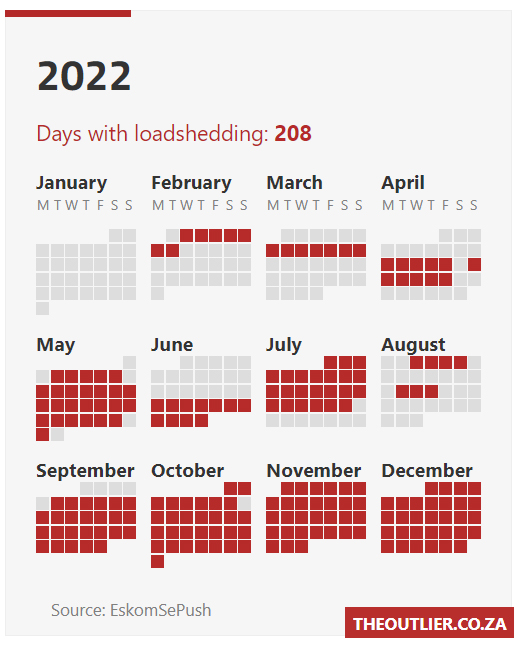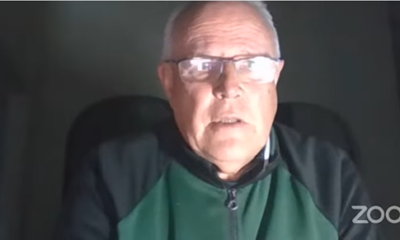
Banner

Take back power by protesting energy crisis, say leaders
Losing ten hours of electricity a day, businesses on their knees, service delivery affected, and people fleeing the country are some of the ramifications of South Africa’s energy crisis. Urgency has been added by the resignation of Eskom Chief Executive André de Ruyter, the possibility of referral of Eskom to Mineral Resources and Energy Minister Gwede Mantashe’s portfolio, and the announcement of ramped-up electricity prices.
However, experts in government and energy say the community can do something about the situation. “Our community can join protest marches and could independently call on government to relax the regulations surrounding independent power producers,” says the Democratic Alliance’s (DA’s) Deputy Shadow Minister for Employment and Labour, Michael Bagraim.
“Proper governance has completely collapsed,” he says. “It’s absolutely vital to have a ring-fenced state of emergency for Eskom. The state of emergency will give government certain powers to ensure that we don’t have a complete grid collapse. The situation is causing massive closure of small businesses across the country which in turn is leading to retrenchment and worsening our unemployment situation which is now already the worst in the world. The lack of energy has caused water problems and is almost destroying agriculture. The increase in the electricity price is just adding insult to injury.”
The National Energy Regulator of South Africa (Nersa) has approved an 18.65% power price rise for the financial year starting on 1 April. Eskom had sought an increase of more than 32%. Nersa approved a 12.74% tariff increase for the following year.
Bagraim says the DA has constantly been “putting pressure on government to give honest answers and structure a way forward. All of this has fallen on deaf ears. The only thing the presidency has suggested is to move control of Eskom to Mantashe. The DA has described this move as tantamount to ‘changing the deck chairs on the Titanic’.
“In essence, this move will merely create further problems such as the removal of the corporatisation of Eskom and further problems with regard to financing. International financiers will want to know about the structuring of the debt that already exists and the repayment of loans. Mantashe has covered himself in disgrace in everything he touches, and it’s our strong belief that Eskom will be placed in a worse-off situation.”
Bagraim believes it’s essential to “entice the old skilled engineers back to work. They are desperately needed to train and guide”. It’s essential to mobilise all the previous skills from the top down.
Two protests have been organised. The DA has organised a mass civil society march on 25 January and #StandUpSA has also organised one on 2 February.
#StandUpSA is demanding uninterrupted electricity, the 18% tariff increase on electricity to be scrapped, coal companies and contractors who supply Eskom with substandard coal to be named and sanctioned, weekly updates on the maintenance of power stations, performance agreements for executives, and a published plan that will lead to an end to load shedding, with deadlines.
“Our shadow minister overseeing Eskom has called for a proper independent investigation by an independent panel who will be assisted by experts to structure a proper way forward,” says Bagraim. “This independent panel will be divorced completely from politicians and political parties. As things are now panning out, there could possibly be a complete grid collapse. Without international finance, and with the move to Mantashe, this grid collapse comes even closer.”
Erin Berman-Levy, an industrial engineer and the chief executive of a company that specialises in renewable energy solutions, says load shedding is “a necessity” in order to prevent total grid collapse. “Load shedding is a symptom of a deeper cause. We essentially don’t have the capacity at the moment to run our power stations at full force because they are so frail, outdated, and in very poor condition. If we run them at full capacity, it could put us at risk of grid collapse.
“This could lead to a two-week blackout, as they will need to be rebooted manually. This would look like one manual generator repowering a bigger system, which will repower a slightly bigger system, and so on,” Berman-Levy says. “One can only imagine what a two-week blackout would do, so load shedding is a necessity for the state of our infrastructure.”
At the same time, Berman-Levy believes a total grid collapse isn’t likely because there are “procedures and processes in place” to avoid it.
The public can “keep putting pressure on government and Eskom to go in the right direction, towards renewable energy. In addition, try to ensure that solar or self-generation solutions are available to more people, especially those who don’t have the resources for it. We need to do whatever we can to help that process along.”
Berman-Levy says he understands the sense of frustration, especially because there are “relatively straightforward solutions that have been ignored”, and even 12 months ago, it seemed like steps were being taken to get there. “But now there’s talk of building another coal power station and there’s no move towards self-production or renewable energy. Eskom has always been a ‘cash cow’ for government, and now it feels like we’re moving backwards. Without question, a more sustainable solution is great for the environment and the country. It’s the only roadmap. Any move in the opposite direction makes me very worried.”
The DA’s shadow minister of international relations and cooperation, Darren Bergman, says, “Load shedding will be here for a while. It’s a stain on our current government’s performance and its lack of new ideas. It’s ridiculous to think the same ministers that helped get us further into the mess are going to be the ones to help us out of the mess.
“The DA march next week to Luthuli House is fully justified as it’s a protest at the party and policies that have got us into this disaster. We’re calling on the very same party to listen to the DA and the nation and take measures to get us out the mess, not next month, not next year, but today. Allow independent producers today, and power to be fed back into the grid for starters.”
In terms of Gwede Mantashe, “I don’t trust him at all to be in charge of Eskom. It’s like asking the wolf to look after the chicken coop.”











Clifford Livingstone
January 19, 2023 at 12:30 pm
None of your commentators have actually proposed a solution. Except getting back old skilled engineers back to work.
There’s no more time or need for enquiries, political answers from Government, thorough investigations, or change of leadership at Eskom.
What’s needed is for the powers that be to acknowledge we’ve failed, and buy in the international help required, eg to get Israel or China to come and take over providing power .
Pamela
January 23, 2023 at 5:24 pm
I agree with Clifford. Time to seek help from outside since we’ve failed miserably to fix it from within. This is only going to get worse.